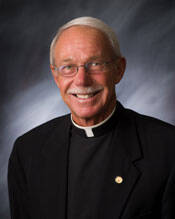As a former university president, I am always happy when America turns its attention to Jesuit higher education. For over three decades I called campus home at five Jesuit institutions. But it wasn’t until recently, when I asked, “When is spring break?” that I realized how much I missed the groves of academe.
Jesuit universities in the United States cast a wide shadow of academic excellence and community engagement. But that was not always so. It was only in the years following World War II that many of these schools evolved into authentic universities, many of them moving into the ranks of America’s most respected institutions.
Part of that success is our distinct mission; that distinctiveness informs how we educate, how we engage our host communities, how we craft a disposition for service in our students and why our graduates continue to make a difference.
Jesuit education is rooted in a spirituality that affirms the human dignity of all and espouses the idea that, to quote Gerard Manley Hopkins, S.J., “the world is charged with the grandeur of God.” In other words, the created world is both good and worthy of study. This Jesuit idea of finding God in all things presupposes a genuine regard for the mystery within the universe and the mystery within the human person. Consequently, the university must be a place of disciplinary mastery, intellectual honesty, pluralism and mutual respect as students study and reflect on the abiding questions of the meaning of life, moral behavior and the conduct of human affairs.
Students are drawn to Jesuit schools in pursuit of wisdom and competence, maturity and spiritual depth, as well as by a desire for ethical grounding, social solidarity and global awareness. In the face of advancing technology and scientific advancement, social disconnection and moral confusion, we hope to provide a compass that will facilitate the kind of intellectual, ethical, social and religious integration Jesuit education has traditionally espoused.
Undoubtedly members of Jesuit universities fall short of perfection in executing this vision, but that does not mean we do not continue to seek the greater good. Students may champion the secular but not lose the faith; indeed, they may develop a rich spirituality and sense of justice; they may adopt a cause or develop political views different from their parents; or they may be civilly disengaged. Yes, they may return home and even live in their former rooms, but their Jesuit education remains within them—an inner compass.
Then again, they may develop a deep and mature faith and prayer life, embrace environmental sustainability, continue being generous in service, develop a global perspective, actively embrace a diversity of persons and ideas, be gainfully employed and learn how to live well and do good for others—all guided by their Jesuit compass.
A few weeks ago, our editors asked Jesuit university students to tweet their observations about faith and life choices [see p. 14 ff. of this issue]. Here is a sample of their responses:
I see faith convincingly at work on campus in the demeanor that every teacher has towards students; they care about us.
...faith plays a large role in my decisions.
My faith is constitutive to the way I experience and see the world around me and, thus the way I choose to live my life.
I see faith guiding service activities.
When it comes to Jesuit education, I paraphrase what St. Paul says in the Acts of the Apostles: “I am compelled to proclaim what I have seen and heard.”









For the record, I would like to note that in 1943, before the end of World War II, Edward A. Doisy, M.D., in biochemistry in the School of Medicine at St. Louis University was the co-recipient of the Nobel Prize in physiology and medicine for his work in the isolation of Vitamin K.
AMDG, indeed!